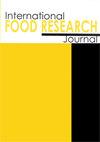Probiotic yoghurt fortified with rosehip seed powder: Viability, physicochemical, and sensorial properties
IF 1
4区 农林科学
Q4 FOOD SCIENCE & TECHNOLOGY
引用次数: 0
Abstract
The impact of rosehip seed powder (RSP) fortification (1, 2, and 3%) on some physicochemical characteristics and bacterial survival of set type probiotic yoghurt was evaluated during 21-d storage at 4°C. Textural, microstructural, total phenolic content, antioxidant activity, and sensorial attributes were also assessed in the samples, with and without RSP fortification. Milk was fermented by yoghurt cultures with the inclusion of the probiotic cultures comprising Lactobacillus acidophilus and Bifidobacterium animalis subsp. lactis. The total solid, protein, and total phenolic contents in yoghurts fortified with RSP were significantly higher than control, and an enhancement in the yoghurt's antioxidant capacity and firmness, while a reduction in yoghurt's adhesiveness and syneresis occurred (p < 0.05). However, sensory scores were lower in RSP-fortified yoghurts than in control. Throughout 21-d storage, the yoghurt's titratable acidity increased while its syneresis and pH decreased. The present work also determined that RSP fortification of probiotic yoghurt increased (p < 0.05) in L. acidophilus and B. animalis subsp. lactis growth (up to 8.24 and 8.10 log CFU/g, respectively) as compared to their respective controls (7.84 and 7.83 log CFU/g, respectively), and probiotic counts in yoghurts fortified with RSP remained over 6 log CFU/g at the end of storage. The documented knowledge of fortifying probiotic yoghurts with RSP could inspire the dairy industry to generate a novel synbiotic product while utilising wasted rosehip seeds as processing waste.用玫瑰果籽粉强化的益生菌酸奶:活力、物理化学和感官特性
研究了添加玫瑰果籽粉(RSP)(1、2和3%)对固定型益生菌酸奶在4°C条件下保存21 d的一些理化特性和细菌存活率的影响。还对样品的质地、微观结构、总酚含量、抗氧化活性和感官属性进行了评估,并对有无RSP强化进行了评估。用含嗜酸乳杆菌和动物双歧杆菌的益生菌培养物的酸奶培养物发酵牛奶。lactis。添加RSP的酸奶中总固体、蛋白质和总酚含量显著高于对照组,酸奶的抗氧化能力和硬度增强,而粘连性和协同性降低(p <0.05)。然而,与对照组相比,rsp强化酸奶的感官得分较低。在21 d的贮藏过程中,酸奶的可滴定酸度增加,而酸碱度和pH值下降。本研究还确定益生菌酸奶的RSP强化增加了(p <0.05),在嗜酸乳杆菌和动物芽孢杆菌亚种。与对照组(分别为7.84和7.83 log CFU/g)相比,添加RSP的酸奶的乳酸生长(分别为8.24和8.10 log CFU/g),益生菌数量在储存结束时保持在6 log CFU/g以上。用RSP强化益生菌酸奶的文献知识可以激励乳制品行业生产一种新的合成产品,同时利用废弃的玫瑰果种子作为加工废料。
本文章由计算机程序翻译,如有差异,请以英文原文为准。
求助全文
约1分钟内获得全文
求助全文
来源期刊

international food research journal
Agricultural and Biological Sciences-Food Science
CiteScore
1.40
自引率
0.00%
发文量
75
期刊介绍:
The International Food Research Journal (IFRJ) publishes papers in English, six (6) issues a year with the coverage of:
Food Science and Technology
Nutrition and Dietetics
Agriculture, multidisciplinary
Chemistry, multidisciplinary
The scope of the Journal includes:
Food Science, Food Technology and Food Biotechnology
Product Development and Sensory Evaluation
Food Habits, Nutrition, and Health
Food Safety and Quality
Food Chemistry, Food Microbiology, Food Analysis and Testing
Food Engineering
Food Packaging
Food Waste Management
Food Entrepreneur
Food Regulatory
Post-Harvest Food Management
Food Supply Chain Management
Halal Food and Management
 求助内容:
求助内容: 应助结果提醒方式:
应助结果提醒方式:


